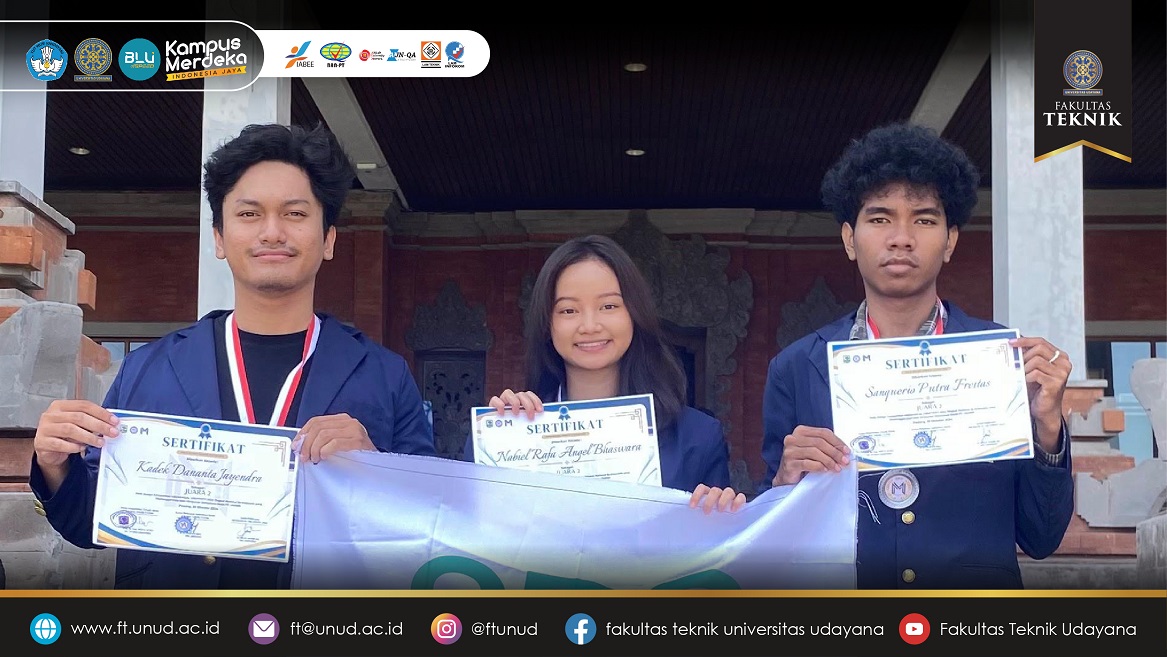Curriculum Book
CURRICULUM
In accordance with the standards and accreditation procedures for undergraduate programs issued by the National Accreditation Board for Higher Education (BAN-PT, 2008), the curriculum is defined as the design of all student learning activities, serving as a reference for the Study Program in planning, implementing, monitoring, and evaluating its academic activities to achieve the program’s goals. Furthermore, it is emphasized that the curriculum and its components must be periodically reviewed by the Study Program together with stakeholders (considering both social and epistemological relevance) to align with scientific and technological advancements as well as stakeholder needs.
In line with this mandate, the Mechanical Engineering Study Program, Udayana University (PSTM UNUD) conducted a comprehensive evaluation of the 2016–2020 curriculum. Curriculum evaluation is carried out every five (5) years, with the possibility of annual reviews if necessary. The development of the 2021–2026 curriculum refers to:
-
Competency-based curriculum development guidelines, Directorate General of Higher Education, 2008.
-
Decree of the Minister of National Education No. 232/U/2000 on Guidelines for Higher Education Curriculum and Student Learning Assessment.
-
Decree of the Minister of National Education No. 045/U/2002 on the Core Curriculum of Higher Education.
-
Directorate General of Higher Education Decree No. 44/Dikti/Kep/2006 on Community Life Courses in Higher Education.
-
Directorate General of Higher Education Decree No. 43/Dikti/Kep/2006 on Personality Development Courses in Higher Education.
-
Circular Letter of the Directorate General of Higher Education No. 06/D/T/2010 concerning the Implementation of Pancasila Education Courses.
-
Provisions of Udayana University’s Institute for Community Service (2010) on the Community Service–Community Empowerment Program (KKN-PPM).
-
Core Curriculum of Mechanical Engineering Undergraduate Programs, BKSTM 2010.
-
Enhancement of the Indonesian National Qualification Framework (KKNI) in Mechanical Engineering, BKSTM 2014.
-
Law of the Republic of Indonesia No. 12 of 2012 on Higher Education.
-
Ministerial Regulation No. 73 of 2013 on the Implementation of KKNI in Higher Education.
-
Ministerial Regulation No. 49 of 2014 on National Standards for Higher Education.
-
Higher Education Curriculum Book, Directorate General of Higher Education, 2014.
-
Ministerial Regulation No. 44 of 2015 on National Standards for Higher Education.
-
Ministerial Regulation No. 3 of 2020 on National Standards for Higher Education concerning the Merdeka Belajar–Kampus Merdeka (MBKM) policy.
The development of the 2021–2026 KKNI-based curriculum has the strategic objective of preparing graduates who are skilled, professional, adaptive, and globally competitive, aligned with local, national, and international labor market demands. The curriculum also serves as intellectual capital with high flexibility, enabling graduates to compete in work environments characterized as VUCA (volatile, uncertain, complex, ambiguous).
The previous curriculum structure included concentrations in Energy Conversion, Manufacturing, Hospitality Engineering, and Automotive. In the 2021–2026 revision, these four concentrations are retained, with improvements in elective courses and the integration of MBKM activities, including internships, research, independent projects, student exchanges, and community service. These enhancements are implemented without altering the essential core competencies and while maintaining curricular continuity.
The development of the 2021–2026 PSTM UNUD curriculum takes into account national regulations, the collective work of BKSTM Indonesia, and the needs of industry and society. With this approach, PSTM UNUD graduates are expected to excel in both individual and multidisciplinary teamwork while possessing professional competencies in accordance with KKNI and SN-Dikti standards.
The curriculum structure of 144 credits (SKS) consists of: 105 credits for core competencies, 35 credits for supporting competencies, and 4 credits for additional competencies.

FACULTY OF ENGINEERING